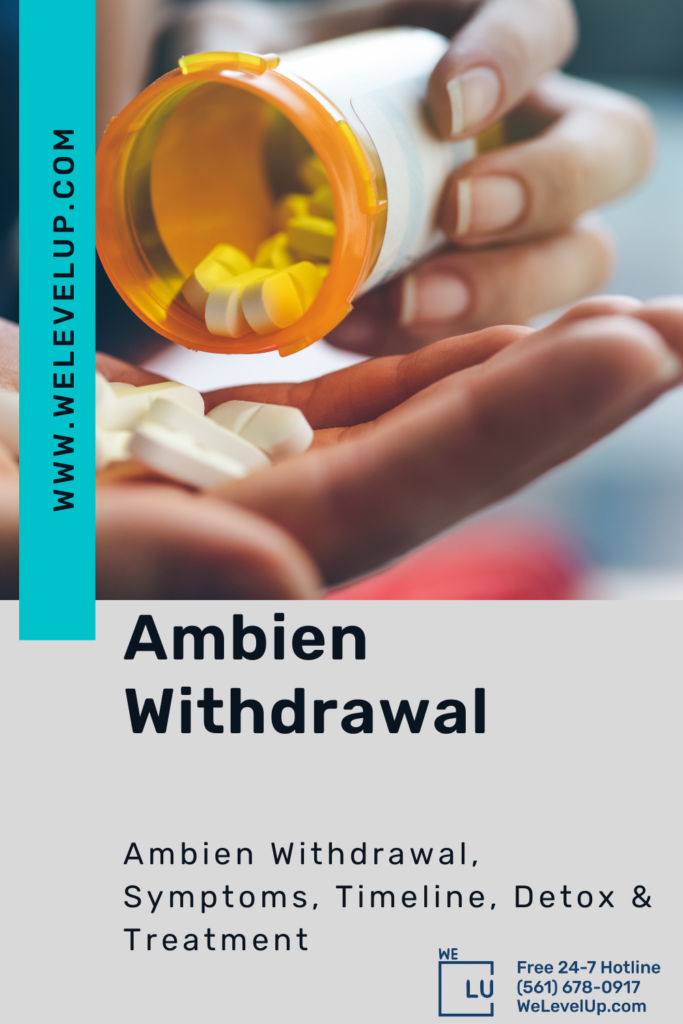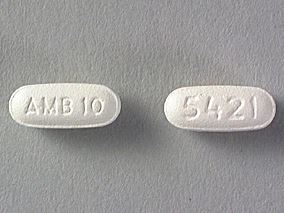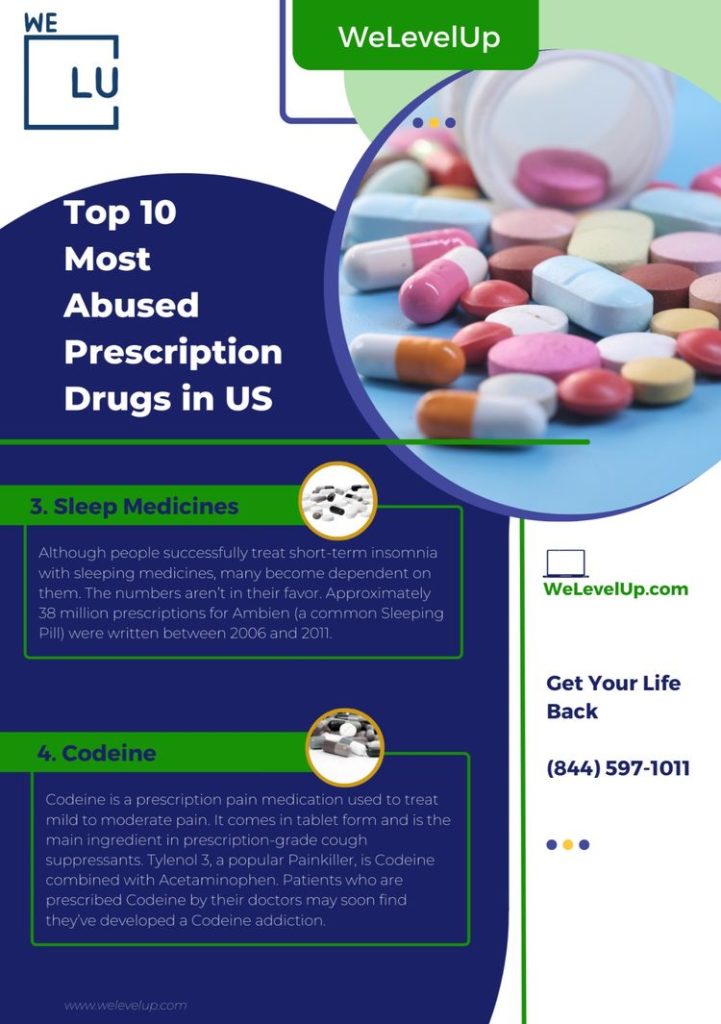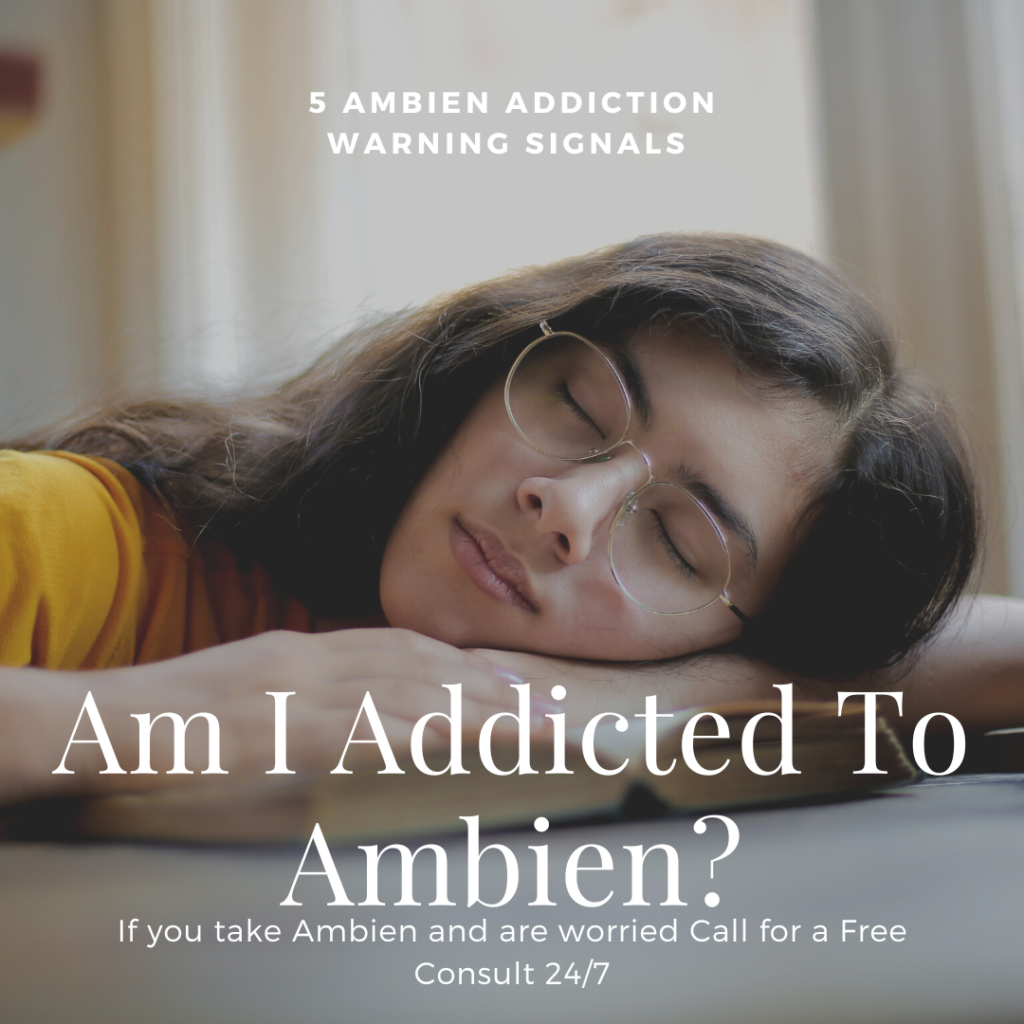Is Ambien Addictive? (Zolpidem) Ambien Addiction Signs & Ambien Addiction Treatment Centers Options.
Zolpidem or Ambien can be addictive if used improperly or for an extended period of time. People who take Ambien for more than a few weeks risk developing a dependence on the drug, which can lead to addiction.
By We Level Up | Editor Yamilla Francese | Clinically Reviewed By Lauren Barry, LMFT, MCAP, QS, Director of Quality Assurance | Editorial Policy | Research Policy | Last Updated: March 20, 2023
Ambien Addiction Dangers
Zolpidem or Ambien is a sedative-hypnotic medication used for the short-term treatment of insomnia. It is in the class of drugs known as benzodiazepines, which can be habit-forming and cause physical dependence when taken in high doses or for long periods of time. Despite its intended purpose to help people sleep, Ambien has been abused by some individuals resulting in Ambien addiction.
Ambien’s addictive dangers include:
- Memory loss.
- Nausea and vomiting.
- Hallucinations.
- Dizziness.
- Headaches.
- Drowsiness.
- Overdose.
- Severe respiratory depression.
Ambien’s addictive signs include:
- Problem sleeping without Ambien
- Requiring bigger doses of Ambien to sleep.
- Abusing Ambien for non-medical reasons.
- Retreating from social activities because of Ambien usage.
- Expanded tolerance for Ambien.
- Experiencing Ambien withdrawal symptoms.
- Expending significant time and resources obtaining and using Ambien.
- Ambien abuse leads to deterioating life, work, and school relationships and impacting daily life.
What Is Ambien?
Ambien is the brand name of Zolpidem. It is primarily prescribed as a temporary treatment for sleeplessness. Ambien is taken by mouth as a small, oblong, extended-release tablet. Some people may crush and snort the pills for a more substantial effect. Slang terms for Ambien include no-gos, zombie pills, sleep easy, tic-tacs, and A-minus.
Ambien was primarily marketed as an alternative to benzodiazepines, like Halcion, which came under public scrutiny for their addictive potential and other side effects. The makers of Ambien claimed their drug was safer and less addictive. However, research indicates that this claim was overstated. Long-term use of Ambien is also linked to major health hazards, such as an increased risk of respiratory problems, reflux, and infections.
Is Ambien Addictive?
Ambien is addictive and a schedule IV controlled substance. According to the Drug Enforcement Agency (DEA), people aren’t likely to use it recreationally. Despite this, many users have abused the drug for its euphoric and hallucinatory effects.
The potential for Ambien addiction comes from the way the drug affects the brain’s reward pathways, activating certain neurotransmitters that produce feelings of pleasure and relaxation. Over time, this can lead to dependence on the drug as users become desensitized to it and need larger amounts to achieve the same effects.
Ambien Addiction Signs
Several signs may indicate an Ambien addiction. These may include:
- Taking larger doses than prescribed: People addicted to Ambien may start taking larger doses to achieve the same level of sedation or relaxation they previously experienced.
- Continued use despite negative consequences: An addiction to Ambien may result in continued drug use despite negative consequences to one’s health, interpersonal relationships, or daily life.
- Cravings for Ambien: An addiction to Ambien may trigger cravings for the drug, leading to continued use.
- Withdrawal symptoms when not using Ambien: People who are addicted to Ambien may experience withdrawal symptoms when they stop being able to use it.
- Loss of control: Someone addicted to Ambien may find it difficult to control their drug use, despite negative consequences or intentions to stop.
- Shifts in behavior: Ambien addiction can cause shifts in behavior patterns such as lethargy, unexplained mood changes, or poor decision-making.
As with drug abuse, serious health risks are associated with ambien addiction. These include impaired judgment and impaired coordination, increased risk of falls and accidents, memory problems, and even potential for overdose.

Ambien Imprint
The imprint on the Ambien drug can vary depending on the manufacturer and strength of the pill. Here are some common imprints for Ambien tablets:
- Ambien 5 mg: A~375.
- Ambien 10 mg: AMB 10, 5421.
- Ambien CR 6.25 mg: AMB 064.
- Ambien CR 12.5 mg: AMB 622.

Skip To:
Learn More:
- How Long Does Ambien Withdrawal Last?
- Ambien Abuse Side Effects
- Ambien And Alcohol
- Sedatives Addiction: Symptoms, Dependence, Treatment
- Sleeping Pills and Alcohol
- Lunesta Detox
- Is Ativan Addictive? Lorazepam Addiction Signs, Symptoms, & Treatment
- Restoril Detox
- How Dangerous is Valium?
- Xanax Addiction Signs, Alprazolam Effects, Abuse & Treatment
- 10 Most Abused Prescription Drugs In The US
- Signs of Drug Abuse
- Codeine Addiction Treatment
- Depressant Drugs Health Risks & Treatment
- Benzos for Anxiety and Depression
- Can You Overdose on Melatonin?
Ambien Addictive Affects
It is essential to note that not everyone who takes Ambien will become addicted. But those who do may experience psychological or physical dependence on the drug, which can have serious implications if left untreated.
The best way to avoid an ambien addiction is to follow your doctor’s instructions carefully and take only the prescribed dose at the recommended time. If you are concerned that you or someone you know may be developing an ambien addiction, seek help from a medical professional immediately. With proper treatment and support, it is possible to overcome an ambien addiction and reclaim a healthier life.
Ambien Fact Sheet
Also known as Zolpidem
Ambien Brands
The following brand names for zolpidem are also used: Ambien, Ambien CR, Edluar, Intermezzo, and Zolpimist.
Ambien Availability:
It is only available by prescription.
Ambien & Pregnancy
No conclusive evidence exists to support the claim that zolpidem use during early pregnancy results in birth abnormalities in the fetus. According to certain research, pregnant women who use zolpidem and comparable medications run the risk of having a baby that is born prematurely or with a low birth weight.
Ambien & Alcohol
Medical professionals stress that combining alcohol with Ambien or other Zolpidem-based drugs is never safe and almost always increases the risk of an overdose.
Ambien Drug class
Sedative-hypnotics are a class of drugs that includes zolpidem. It functions by reducing brain activity to promote sleep.

Get Your Life Back
Find Hope & Recovery. Get Safe Comfortable Detox, Addiction Rehab & Dual Diagnosis High-Quality Care.
Hotline(844) 597-1011How Can You Get Addicted To Ambien?
Ambien is in a class of drugs known as sedative-hypnotics. It works by activating the neurotransmitter GABA, which slows down the brain and the central nervous system. Ambien is used to treat insomnia but is only intended for short-term use. Ambien addiction is due to prolonged use to fall asleep. There are two forms of Ambien; a quick-release form that helps initiate sleep and an extended-release form that helps maintain sleep.
Ambien makers created and marketed the drug as a less addictive alternative to benzos for acute insomnia. However, while it generally takes users longer to develop an addiction to Ambien than to Benzos, and withdrawal from Ambien is usually less severe and dangerous than Benzo withdrawal, Ambien is still an addictive substance. In addition, it is now recognized that Ambien has a similar potential for abuse as Benzos, causing Ambien addiction.
The physical dependence on Ambien can form in as little as two weeks, whether the user is following a prescription or abusing the drug. In addition, the user requires more significant amounts of the substance to feel the same effect. Ambien addiction withdrawal symptoms appear if they stop taking the drug or reduce their dosage.
A full-blown addiction to Ambien is possible; cravings characterize this reduced control over usage, compulsive use, and persistent use despite negative effects. Many people are unaware of a problem until they stop using the medication and discover they can’t sleep without it.
Additional Ambien Like Sedative-Hypnotics include:
- Ativan
- Restoril
- Valium
- Xanax
- Lunesta
- Sonata

Eventually, Ambien dependence may become a full-blown addiction characterized by increased tolerance, withdrawal symptoms, impaired control, compulsive use, continued use despite harm, and cravings. Unfortunately, many people don’t know they have a problem until they stop taking the drug and realize they cannot sleep without it.
Ambien Addiction Signs and Side Effects of Ambien Addiction
- Refilling prescriptions unusually often
- Repeatedly taking larger doses than prescribed
- Experiencing cravings for Ambien
- Engaging in dangerous situations without any memory of them later
- Spending large amounts of money on the drug
- Isolating oneself from family and friends
Ambien addiction begins with a simple case of short-term insomnia. Some users underestimate the addictive potential of Ambien because a doctor prescribes it, and they only use it to help them sleep. Ambien becomes less and less effective after taking it for over a few weeks. At this point, some users can’t stop taking the drug because their insomnia is even worse — they cannot sleep without Ambien.
Get Help. Get Better. Get Your Life Back.
Searching for Accredited Drug and Alcohol Rehab Centers Near You?
Even if you have failed previously and relapsed, or are in the middle of a difficult crisis, we stand ready to support you. Our trusted behavioral health specialists will not give up on you. When you feel ready or just want someone to speak to about therapy alternatives to change your life call us. Even if we cannot assist you, we will lead you to wherever you can get support. There is no obligation. Call our hotline today.
(844) 597-1011Ambien Addiction Treatment Programs
- Medically supervised Ambien detoxification (MAT) to safely manage withdrawal symptoms. Ambien MAT combines behavioral therapy with medication to manage cravings and withdrawal symptoms. Medications, such as Suboxone or Naltrexone, are used to mitigate the side effects of withdrawal.
- Inpatient Ambien rehab programs address underlying mental health issues and teach coping skills. Ambien Inpatient rehab treatment programs provide round-the-clock support and care for individuals struggling with Ambien addiction. This type of program typically involves residing at a treatment center for an extended period of time, usually ranging from a few weeks to a few months.
- Group therapy and 12-step programs to provide support through recovery. Support groups like 12-step programs or SMART Recovery provide a supportive community and a structured plan for addiction recovery.
- Cognitive-behavioral therapy to address any issues that may have contributed to Ambien addiction. CBT is a therapy that aims to modify negative thoughts and behaviors related to Ambien addiction. This is achieved by identifying the underlying thoughts and beliefs that drive addiction and working to replace them with healthier, more positive ones.
- Outpatient Ambien treatment programs. Ongoing support and aftercare to maintain sobriety and prevent relapse. Outpatient rehab programs allow individuals to receive treatment while living at home and attending to their everyday responsibilities. This type of program typically involves attending counseling sessions and group meetings several times a week.
It’s vital to seek professional help when someone suspects Ambien addiction to prevent any dangerous consequences or results in daily life.
Ambien Addiction Treatment FAQs
How Do You Know If You Are Addicted To Ambien?
Some signs of Ambien addiction that you can notice are:
-Refilling prescriptions unusually often.
-Repeatedly taking larger doses than prescribed.
-Experiencing cravings for Ambien.
-Engaging in dangerous situations without any memory of them later.
-Spending large amounts of money on the drug.
-Isolating oneself from family and friends.
Why Is Ambien So Addictive?
Ambien addiction begins with a simple case of short-term insomnia. Is Ambien addicting? Yes, it is. Some users underestimate how addictive Ambien can be because their family doctor prescribes it, and they only use it to help them sleep. However, Ambien becomes less and less effective after taking it for over a few weeks. At this point, some users can’t stop taking the drug because their insomnia is even worse. And they are incapable of sleeping without taking Ambien.
How Long Does It Take To Get Addicted To Ambien?
There are negative consequences associated with Ambien and other zolpidem-containing sleep aids. When drug use first starts, these negative effects appear. They can swiftly get worse. After only a short while, you could develop a drug dependence or addiction.
Is Ambien Addicting Even at a 5mg dose?
While Ambien has a low risk of misuse and dependence, per the DEA Scheduling, it can quickly become an abused sleeping pill. The danger of withdrawal symptoms when you try to stop using Ambien is increased by considerable physical and psychological reliance that can develop from self-medicating or long-term Ambien use.

Am I Addicted To Ambien?
Here are five warning signals to look out for if you’re worried that you or a loved one may be developing an addiction to Ambien:
- Family members notice a change in you.
- Problems emerge at work or school.
- Financial problems keep getting worse.
- You are unable to stop using Ambien.
- New health issues are emerging.
Ambien Addiction Side Effects And Risks
With pharmaceuticals and other substances, it’s important to be informed of the risks and potential adverse effects. It turns out that Ambien has a larger risk of abuse, tolerance, physiological dependency, and withdrawal than previously believed. Some possible addiction to Ambien side effects and addiction to Ambien symptoms are:
- Aggression
- Anxiety
- Depression
- Doing things, you can’t remember
- Drowsiness
- Impaired Driving
- Lack of Coordination
- Nightmares
- Slowed reaction time
- Suicidal Thoughts
Insomniacs have trouble getting to sleep or staying asleep. Your insomnia can worsen if you’ve tried to stop taking Ambien after using it for a long time.
Intensifying sleep apnea, reflux, persistent sinus infections, coughs, and laryngitis are possible additional long-term dangers.
Given that Ambien’s effects can become tolerable, you might need to take higher doses of the medication to achieve the same effects. Some persons who take Ambien claim that they experience euphoria rather than sleepiness.
Ambien Abuse Symptoms
If you take Ambien and are worried, or if a loved one is addicted to the drug, you should be aware of these possible Ambien abuse symptoms:
- Illegally obtaining Ambien.
- Mixing it with additional chemicals.
- Ambien-related driving offenses.
- Having withdrawal symptoms when attempting to quit.
- Committing prescription fraud.
- Taking it differently than as directed.
- Missing critical events while sleeping.
- Strange cravings.
- Attempting to reduce or quit yet failing.
- Taking Ambien every night.
- Obtaining prescriptions from multiple physicians.
First-class Facilities & Amenities
World-class High-Quality Addiction & Mental Health Rehabilitation Treatment
Rehab Centers TourRenowned Addiction Centers. Serene Private Facilities. Inpatient rehab programs vary.
Addiction Helpline(844) 597-1011Proven recovery success experience, backed by a Team w/ History of:
15+
Years of Unified Experience
100s
5-Star Reviews Across Our Centers
10K
Recovery Success Stories Across Our Network
- Low Patient to Therapist Ratio
- Onsite Medical Detox Center
- Comprehensive Dual-Diagnosis Treatment
- Complimentary Family & Alumni Programs
- Coaching, Recovery & Personal Development Events
Ambien Abuse
Taking Ambien without a prescription or in any way not directed by a doctor is abuse. Once someone tolerates Ambien, they need larger doses to fall asleep. This strengthens their dependence on the drug to sleep and causes many users to escalate their doses without medical guidance.
Ambien is meant to be taken immediately before bed, but some people have been known to take the drug hours before sleeping. This leads to a euphoria that washes away insecurity and self-conscious behavior.
Ambien is a safer alternative to benzodiazepine sedatives in some ways because there is less potential to overdose on the drug. It may be hard to detect an Ambien overdose because the signs of overdose are similar to the effects of the drug. As a potent central nervous system depressant, Ambien, when taken in large doses, can slow a user’s breathing and heart rate to the point where respiratory failure occurs. The result could be a fatal overdose. Prolonged breathing or heartbeat strongly indicates the user is in trouble.
Common Drug Combinations
One of the most common substances used with Ambien is alcohol. When someone’s tolerance to Ambien builds, they need higher drug doses to fall asleep. Some people with Ambien tolerance take a drink with their pill to amplify the drug’s sedative effects. This is dangerous because both drugs depress the central nervous system.
Some people have also combined Ambien with benzos, like Valium. This is especially dangerous because Ambien is similar to benzos, both central nervous system depressants. There is also a risk of heart, brain, and lung damage.
Recovering from Ambien addiction begins with a medically-assisted detox. The detox process helps prevent relapse and issues caused by withdrawal symptoms. In addition, many inpatient rehabs and outpatient clinics provide resources for detox and counseling to work out behaviors that lead to Ambien use. If you’re struggling with an Ambien addiction and ready to quit, contact a dedicated treatment provider to find out about your treatment options today.
Treatment For Ambien Addiction And Withdrawal
You may suffer more severe withdrawal symptoms if you have taken Ambien in heavy doses or have a long term Ambien addiction. Withdrawal symptoms may begin within 48 hours of quitting or reducing Ambien use. Withdrawal symptoms might include:
- Agitation.
- Panic or anxiety attacks.
- Tremors.
- Abdominal discomfort and cramping in the stomach.
- Delirium.
- Disorientation.
- Seizures.
- Restlessness.
- Hallucinations.
- Sickness or vomiting.
- Increased respiratory rate, pulse, or blood pressure.
- High fevers.
- Irritability.
- Insomnia.
- Sweating.
- Fatigue.
When you reduce your substance usage in a facility under the supervision of experienced medical personnel, this process is referred to as medically managed withdrawal, often known as medical detox. The existence of a potential risk of withdrawal seizures is supported by case report information. As a result, medical care for Ambien withdrawal may be advantageous as this consequence can be fatal. A treatment center’s staff can give you medication and constantly monitor you to ensure your safety.
You will start treatment after you have finished detox. With the help of your treatment team, you should go over your options and choose what is best for you. Ambein addiction treatment options include:
- Outpatient treatment: While still residing at home, you attend multiple individual therapy sessions in a week and once a month for a psychiatrist appointment. Although it is considerably less intensive and restrictive, you can still receive care comparable to that provided in an inpatient setting. The best candidates for outpatient therapy are those who have finished inpatient therapy or have robust, encouraging social networks at home.
- Inpatient treatment: This facility allows you to remain while receiving rigorous group and one-on-one therapy. You will learn about addiction, relapse prevention, self-care, and how to treat insomnia without turning to addictive sleep aids for patients recovering from Ambien usage.
World-class, Accredited, 5-Star Reviewed, Effective Addiction & Mental Health Programs. Complete Behavioral Health Inpatient Rehab, Detox plus Co-occuring Disorders Therapy.
CALL(844) 597-1011End the Addiction Pain. End the Emotional Rollercoaster. Get Your Life Back. Start Drug, Alcohol & Dual Diagnosis Mental Health Treatment Now. Get Free No-obligation Guidance by Substance Abuse Specialists Who Understand Addiction & Mental Health Recovery & Know How to Help.
Recovery and Rehab For Ambien Addiction
Living sober is a necessary part of recovering from an Ambien addiction. Utilizing insomnia management tactics will help you avoid using sleeping drugs. Unmanaged insomniacs must also learn about their diagnosis, the factors that set off their Ambien addiction symptoms, and effective coping mechanisms to heal.
Learning to function without Ambien might be challenging and irritating in the short run. You can have trouble falling asleep and have intense Ambien cravings. You could train a variety of skills, such as:
- Avoid using electronics, coffee, or exercise right before bed.
- Going to bed every night at the same hour.
- Using cognitive behavioral treatment (CBT).
- Relaxation methods, such as yoga and meditation.
- Keeping your space dark and cool.
It’s critical to give treatment first priority. Following therapy, many people join 12-step programs or other peer support organizations. These are frequently comparable to group therapy in that you can discuss your struggles and achievements with others who are going through substance abuse recovery.
Ambien Addiction Treatment Centers
The We Level Up Ambien addiction treatment centers provide world-class care with round-the-clock medical professionals available to help you cope. We work as an integrated team providing support through Ambien addiction and other aspects of treatment. Make this your opportunity to reclaim your life. Call today to speak with one of our treatment specialists. Our specialists know what you are going through and will answer any of your questions.
Your call is private and confidential, and there is never any obligation.

We Level Up Fort
Lauderdale
Premier Behavioral Health Treatment Center
- Inpatient mental health treatment center
- Therapy for depression, anxiety, trauma, bipolar disorder, PTSD, and more.
- Dual diagnosis rehab programs available

West Palm Beach
(coming soon)
Premier Behavioral Health Treatment Center
- Inpatient mental health treatment center
- Therapy for depression, anxiety, trauma, bipolar disorder, PTSD, and more.
- Dual diagnosis rehab programs available

We Level Up
California
Drug & Alcohol Addiction Treatment Center w/Detox
- Inpatient addiction rehab center w/medical detox
- Addiction treatment and detox for alcohol, benzo, heroin, opioid, and more.
- Secondary mental health treatment available as part of our dual diagnosis programs.
Experience Transformative Recovery at We Level Up Treatment Centers.
See our authentic success stories. Get inspired. Get the help you deserve.
Start a New Life
Begin with a free call to an addiction & behavioral health treatment advisor. Learn more about our dual-diagnosis programs. The We Level Up Treatment Center Network delivers recovery programs that vary by each treatment facility. Call to learn more.
- Personalized Care
- Caring Accountable Staff
- World-class Amenities
- Licensed & Accredited
- Renowned w/ 100s 5-Star Reviews
We’ll Call You
Prescription Drug Addiction Recovery & Sobriety Video
Jen’s Addiction Recovery Story:
“I wanted my life back. I was a shell of a person. I wanted to be trusted; I wanted relationships back that I lost, mainly my children and family. It started innocent enough, I got into a car accident, and then I got sucked into the whole, you know, medication issue with the pills. And before I knew it, I was in a cloud.
I was sucked in by addiction and with my mind, I kept thinking it was OK because a doctor was prescribing this for me, a doctor was giving me this, a doctor was giving me that. So, I didn’t think I was doing anything wrong. Level Up supports my family and my relationships with them, and they’ve helped me grow.
When I first started there, I was so intimidated and scared, you know? But, they’ve taught me, they’ve taught me how to come into my own. And then, you know, when I get the call from my twenty-one-year-old daughter in the middle of the day, to say ‘I love you, Mom.’ that’s amazing.”
Sources
Schifano, F., Chiappini, S., Corkery, J.M., & Guirguis, A. (2019). – An insight into Z-drug abuse and dependence: An examination of reports to the European Medicines Agency database of suspected adverse drug reactions. International Journal of Neuropsychopharmacology, 22(4), 270-277.
Victorri-Vigneau, C., Dailly, E., Veyrac, G., & Jolliet, P. (2007). – Evidence of zolpidem abuse and dependence: Results of the French Centre for Evaluation and Information on Pharmacodependence (CEIP) network survey. British Journal of Clinical Pharmacology, 64(2), 198-209.
S. National Library of Medicine. (2019). – Zolpidem.
Joya, F. L., Kripke, D. F., Loving, R. T., Dawson, A., & Kline, L. E. (2009). – Meta-analyses of hypnotics and infections: Eszopiclone, ramelteon, zaleplon, and zolpidem. Journal of Clinical Sleep Medicine, 5(4), 377–383.
United States Drug Enforcement Administration. – Drug scheduling.
S. National Library of Medicine. (2016). – Label: Ambien – zolpidem tartrate tablet.
Dudyala, S., Reddy, P.R.K., & Siddarama, R. (2018). – A case report on zolpidem abuse: Dependence and withdrawal syndrome. Journal of Basic and Clinical Pharmacy, 9, 73-74.
Heydari, M. & Isfeedvajani, M.S. (2013). – Zolpidem dependence, abuse, and withdrawal: A case report. Journal of Research in Medical Sciences, 18(11), 1006-1007.
Center for Substance Abuse Treatment. (2015). – Detoxification and substance abuse treatment. Treatment Improvement Protocol (TIP) Series, No 45. HHS Publication No. (SMA) 15-4131. Rockville, MD: Center for Substance Abuse Treatment.
National Institute on Drug Abuse. (2012). – Principles of drug addiction treatment: A research-based guide (3rd edition).


